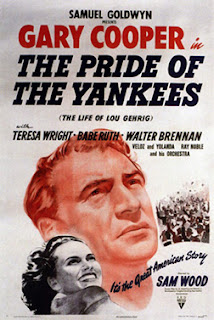The Pride of the Yankees
I've just started reading a biography of Lou Gehrig, so I thought I'd watch The Pride of the Yankees and see how much is actually true. Some of it. The 1942 film is pretty much hagiography, but Gehrig was certainly more deserving of such a treatment than most, especially Babe Ruth.
Gehrig died in 1941 and the film was out the following year. Director Sam Wood had been a semi-pro ballplayer, and convinced Samuel Goldwyn, who knew nothing about baseball, to make it after showing him Gehrig's "Luckiest Man" speech (called by some the Gettysburg Address of baseball). What I found interesting was that star Gary Cooper also knew nothing about baseball--he had never seen a game before making the movie.
The film is corny as hell but enjoyably so. We get the obligatory scene in which young Lou hits a ball so far he breaks a window. His German parents, domineering mother and hen-pecked father, are delightful comic cliches (Gehrig was, apparently, a mama's boy, just like he is in the film). He then meets his wife, Eleanor (Teresa Wright), the daughter of a hot dog magnate. When she is decorating her house Gehrig's mother overrules her choices with her own monstrous selections, until Gehrig has a talk with her.
For a baseball movie, there isn't that much baseball. There's a rumor that Cooper couldn't bat left-handed so they filmed him hitting right-handed and had him run to third base, but according to Wikipedia that's apocryphal. For someone who didn't know about baseball, though, Cooper has a pretty sweet swing. Babe Ruth, a natural performer, plays himself, but he had to lose about fifty pounds to play the part, because he had already retired and ballooned to 270 pounds.
But Pride of the Yankees kicks into full gear when Gehrig starts to get sick. He takes himself out of a game after his 2,130 consecutive game streak (a record until Cap Ripken Jr. broke it). He is diagnosed with amyotrophic lateral sclerosis, which now bears his name, and gives that speech on a day honoring him. There actually is only a few snippets of Gehrig's speech on film, so most people know it by Cooper's rendition, and he couldn't have done it better. I'll admit there were tears in my eyes.
The Pride of the Yankees isn't a perfect film by any means, but it's a good example of how they made movies in the '40s, pushing goodness and light and heralding good guys, who were often played by Gary Cooper.
Gehrig died in 1941 and the film was out the following year. Director Sam Wood had been a semi-pro ballplayer, and convinced Samuel Goldwyn, who knew nothing about baseball, to make it after showing him Gehrig's "Luckiest Man" speech (called by some the Gettysburg Address of baseball). What I found interesting was that star Gary Cooper also knew nothing about baseball--he had never seen a game before making the movie.
The film is corny as hell but enjoyably so. We get the obligatory scene in which young Lou hits a ball so far he breaks a window. His German parents, domineering mother and hen-pecked father, are delightful comic cliches (Gehrig was, apparently, a mama's boy, just like he is in the film). He then meets his wife, Eleanor (Teresa Wright), the daughter of a hot dog magnate. When she is decorating her house Gehrig's mother overrules her choices with her own monstrous selections, until Gehrig has a talk with her.
For a baseball movie, there isn't that much baseball. There's a rumor that Cooper couldn't bat left-handed so they filmed him hitting right-handed and had him run to third base, but according to Wikipedia that's apocryphal. For someone who didn't know about baseball, though, Cooper has a pretty sweet swing. Babe Ruth, a natural performer, plays himself, but he had to lose about fifty pounds to play the part, because he had already retired and ballooned to 270 pounds.
But Pride of the Yankees kicks into full gear when Gehrig starts to get sick. He takes himself out of a game after his 2,130 consecutive game streak (a record until Cap Ripken Jr. broke it). He is diagnosed with amyotrophic lateral sclerosis, which now bears his name, and gives that speech on a day honoring him. There actually is only a few snippets of Gehrig's speech on film, so most people know it by Cooper's rendition, and he couldn't have done it better. I'll admit there were tears in my eyes.
The Pride of the Yankees isn't a perfect film by any means, but it's a good example of how they made movies in the '40s, pushing goodness and light and heralding good guys, who were often played by Gary Cooper.



Comments
Post a Comment